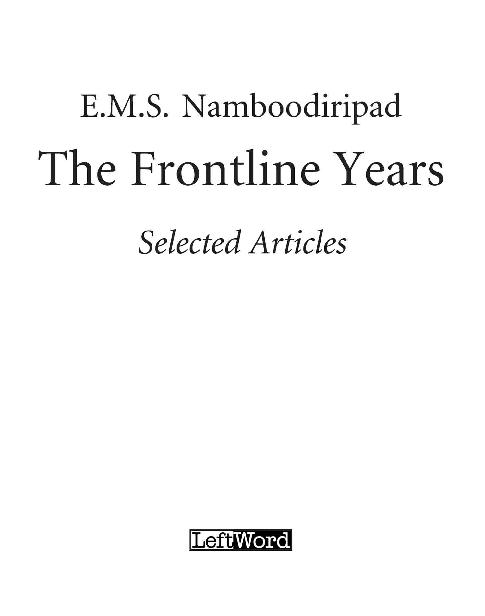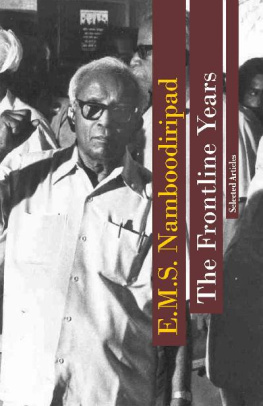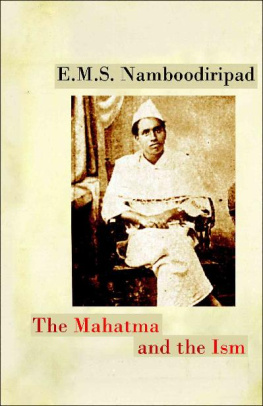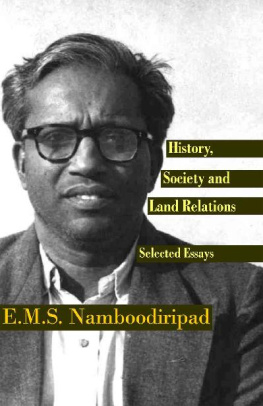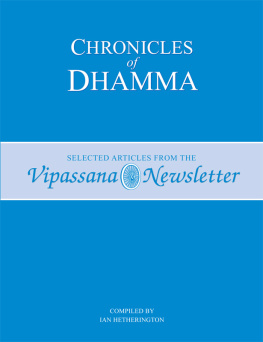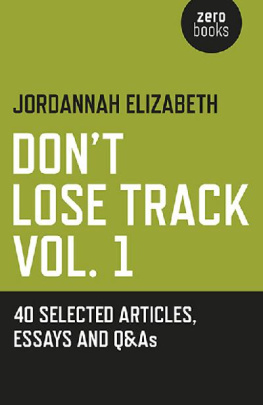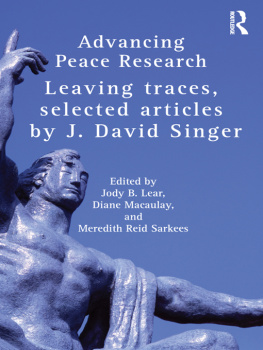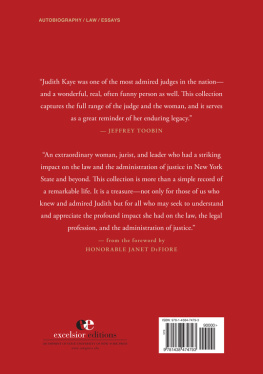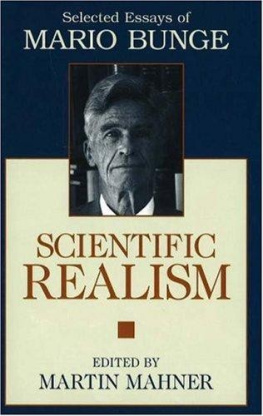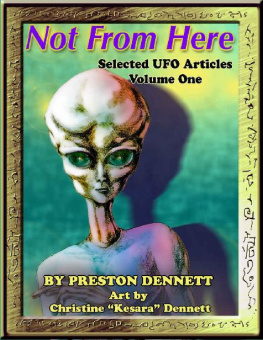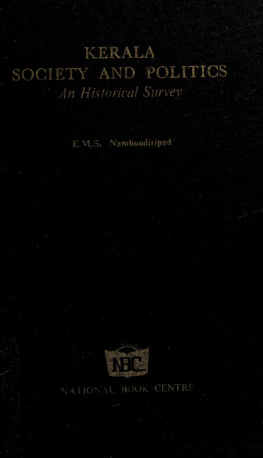The Frontline Years
First published in January 2010
E-book published in September 2019
LeftWord Books
2254/2A Shadi Khampur
New Ranjit Nagar
New Delhi 110008
INDIA
LeftWord Books is the publishing division of Naya Rasta Publishers Pvt. Ltd.
Rights to this work rest with Communist Party of India (Marxist), and it is published under Creative Commons Attribution-Share Alike 2.5 India license. For details of this license, visit http://creativecommons.org/licenses/by-sa/2.5/in/
leftword.com
Contents
by N. Ram
by Prakash Karat
E.M.S. Namboodiripad (19091998) is arguably modern Indias most important revolutionary figure. LeftWord Books is proud to present some of EMSs most important writings in a series of volumes in his birth centenary year.
The present volume puts together a selection of the columns that EMS wrote for the newsmagazine Frontline over the last seven years of his life. The volume also includes a note by N. Ram as EMSs editor at Frontline , and a brief appreciation of EMSs life and contribution by Prakash Karat published in the remembrance issue of the magazine dated April 17, 1998.
The Publisher would like to make grateful acknowledgement to N. Ram, Editor-in-Chief of the The Hindu and Publisher of Frontline , for making possible this volume. Thanks are also due to P. Jacob, K. Rajendra-babu and their colleagues at The Hindu for the speed and efficiency with which the columns were compiled and made available to us. Prasenjit Bose helped in making the selection. A special word of thanks to V. K. Ramachandran for guiding this volume towards publication.
The rights to EMSs writings rest with the Communist Party of India (Marxist), and the present volume is being published under a Creative Commons license, which allows for these writings to be further disseminated under an identical license for non-commercial purposes with due attribution.
N. Ram
Between December 1991 and March 1998, octogenarian E.M.S. Namboodiripad wrote 128 columns for Frontline on an impressiveindeed awesomerange of subjects. For these seven years and more, his was simply the most dependable contribution from the standpoint of the editorial desk. The EMS column always arrived early, invariably on time, and never strayed beyond a self-judged readability limit. No full-time professional journalist could hold a candle to EMS when it came to showing deadline discipline or responding to breaking news or accommodating a special theme-related publishing request. He was a Master at handling history on the wing.
Between December 1991 and April 1994, EMS wrote one column a month for Frontline . Then he proposed in a letter that he had decided to write for every issue, an offer that was gratefully and immediately accepted.
Perspective, the EMS column, ranged over politics, philosophy, economics, education, social movements, literature, cultural affairs, religion and books. He wrote about Marxism and revolutionary socialism, Mao Zedong and Deng Xiaoping, Gandhism, Jawaharlal Nehru, Subhas Chandra Bose, the Indian freedom struggle, other liberation movements and their leaders (especially Nelson Mandela), the ruling classes, planning, secularism, the Rig Veda, Advaita, Hindutva, Centre-State contradictions, budgets, new economic policies, self-reliance, foreign policy, liberation theology, religious fundamentalism, corruption, the politician-criminal nexus, Congress affairs, Sitaram Kesri, Sonia Gandhi, the United Front, coalitions, panchayati raj, decentralization, nuclear policy, working class struggles, empowering women, and handling river water disputes. His last column, posthumously carried in the remembrance issue of Frontline dated April 17, 1998, is titled Centre, States and river waters; it is sharply critical of the AIADMKs demand that the Centre should take over the States rights over river waters.
How the EMS column began for us may be of interest to readers. EMS has always valued serious journalism and been contemptuous of trivializing, entertainment-led tendencies masquerading as journalism. When he was in Chennai for the 1991 Party Congress of the Communist Party of India (Marxist), he conveyed to Frontline s Editor appreciation of what the magazine offered (revealing that he read it from cover to cover) and contrasted this with the vast amounts of trash put out in print. When a request was made that he write a regular column, it was accepted and, in typical EMS style, immediately acted upon.
Within a couple of days after the first cheque by way of payment for the column reached EMS, it was returned with a courteous signed letter. EMS noted that for quite some time he had not been accepting any payment for his articles, royalties and so forth. He was therefore returning our cheque. However, if Frontline wished, any payment for his contributions could be sent to the AKG Centre in Thiruvananthapuram (to which he had assigned all his royalties and so forth). The partys receipt on account of royalties and payments for articles due to EMS has been very substantial.
Prakash Karat
E.M.S. Namboodiripad straddled the history of twentieth century Kerala and the Indian Communist movement in a manner which invokes awe. The word history is what recurs in the Malayalam media while paying tributes to him. History maker, historys man, epochal figure: these are some of the terms which underline the recognition that EMS was something bigger than a successful political leader.
EMS began his public activities in 1930, when as a student he participated in the Namboodiri social reform movement. The quest to make the Namboodiri a human being by breaking the shackles of hide-bound upper-caste conservatism began the remarkable journey to the making of a proletarian revolutionary who strove to liberate the whole of humanity.
EMS, like many other potential Communist leaders, was a product of the major social and political movements of the early decades of the 20th century. As an activist in the social reform movement, he focused on the inhuman system which kept Namboodiri women in gilded bondage. Anti-caste revolt was the first spark. Next came the broader canvas of the anti-imperialist movement. He became a young leader of the Malabar Congress and one of the key organizers of the Congress Socialist Party.
The next big step in the background of the rising peasant struggles against landlordism was the introduction to Marxism and becoming a lifelong adherent to the cause of Communism. This trajectory of political development is mirrored in hundreds of militant young men and women who joined the Left movement in the 1930s.
Two things set EMS apart from all of them and made him unique. First, EMS with his extraordinary intellectual genius was able constantly to stay ahead of his contemporaries in applying Marxism to the specific conditions in Kerala and later the whole of India. He was a path-finder. In 1939, even when his study of Marxism was elementary, he wrote a brilliant note of dissent on the Malabar Tenancy Reforms in the committee set up by the Madras Legislature, of which he was a member. The trenchant analysis of the jenmi (landlord) system and the advocacy of radical land reforms presaged his later pioneering role in initiating land reform measures as the first Chief Minister of Kerala in 1957.
This is only one example; there are many others. His The National Question in Kerala published in 1952 was the first creative application of the Marxist-Leninist approach to the nationality question to a specific nationality in India. This work brought him international attention in Marxist circles. He provided the historical basis for the development of the linguistic nationality of Malayalees, which translated into the foundation of Aikya Keralam , the unified linguistic State which was formed out of Travancore-Cochin and Malabar in 1954.
